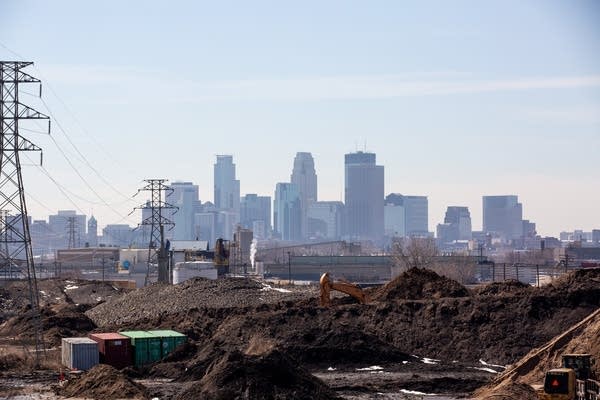Mpls. could control Upper Harbor land as it pursues development

Go Deeper.
Create an account or log in to save stories.
Like this?
Thanks for liking this story! We have added it to a list of your favorite stories.
Under a new plan shared with community members in recent weeks, the city of Minneapolis would retain ownership of roughly 20 acres of prime riverfront land in north Minneapolis that had been slated for sale to a private developer.
The city wants to transform the old Upper Harbor Terminal site — a defunct barge terminal on the Mississippi River — into a mix of parkland, housing, businesses, a music venue and possibly a hotel.
Residents in the racially diverse, mostly low-income neighborhoods around the site, however, have pushed for more control over the project, concerned that it will displace them while enriching developers.
Turn Up Your Support
MPR News helps you turn down the noise and build shared understanding. Turn up your support for this public resource and keep trusted journalism accessible to all.
In response, city officials are proposing that the city keep control of those 20 acres and enter into long-term leases with developers to build mixed-income housing, a community entrepreneur hub and businesses with sustainable jobs with living wages.
“I’ve heard very clearly from community members that they do not want to see the north side riverfront being privatized to private developers,” said Phillipe Cunningham, the Minneapolis City Council member whose 4th Ward includes Upper Harbor. “This is a huge win. For us to maintain ownership of a mile of riverfront property of land is a huge win for the north side.
“The difference between privatizing the land and maintaining public ownership of the land really is accessibility,” Cunningham said, adding that revenue generated by the leases will be reinvested back into the community.

If approved by the City Council, the move to keep control of the land would b a significant change. In 2017, the city signed a deal giving exclusive rights to a development team of United Properties, Thor Companies and First Avenue Productions to build out roughly 25 acres of the site, including an outdoor music venue for as many as 10,000 people.
In March 2019, the City Council approved a concept redevelopment plan. Thor, however, later dropped out as the company’s finances deteriorated.
The plan for Minneapolis to keep control of the Upper Harbor land rather than selling it to developers was a victory for the citizen Collaborative Planning Committee. It shows city officials have been listening, said Markella Smith, the committee’s co-chair.

“That’s what the community has been asking for, and so I guess I think it’s a good thing,” said Smith, who lives on the north side and is also executive director of the McKinley Neighborhood Association there.
Smith and others are seeking another step as part of public ownership — they want north side residents in control of at least part of the development.
“When we talk about community ownership,” she said, “that’s when we dive a little deeper into the African American community owning pieces of this development.”
With the city keeping control of 20 acres at the Upper Harbor site, and another 20 acres expected to become a park managed by the Minneapolis Park and Recreation Board, ownership of about 5 acres remains up for discussion.

United Properties and First Avenue are talking with the Collaborative Planning Committee, the citizen advisory group, about creating a community entity that could buy that land, manage the businesses and operations that are built, including the outdoor music venue.
That community entity may be a community development corporation similar to the 75 North Revitalization Corporation in North Omaha, Neb. That group has seen success in developing a project that benefits the area’s low-income and African American residents; 75 North leaders have been consulting with the Upper Harbor development team.
The land ownership framework and the new community-development corporation will be outlined in a plan that the advisory group is expected to present to the Minneapolis City Council this spring. The plan would need to be ultimately approved by the City Council, which could vote on the matter in June.
Correction (March 12, 2020): This story has been updated to make clear that keeping the land under city ownership is part of a proposal that needs final approval from the City Council in June.


